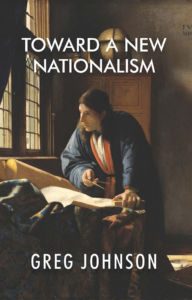The Millennial Mindset
1,713 words
In any effort to fundamentally change society, it is necessary to mobilize the young. The rhetoric on the populist Right often invokes notions of the people rising up, yet it rarely dwells too deeply on the exact profile of a person who is meant to suddenly spring into rebellion.
It could be compellingly argued that we are all living in a world created and dominated by the baby boomers. Those born between approximately the mid-1940s and the 1960s continue to maintain a stranglehold on the American political landscape, with decrepit Joe Biden, born in 1942, battling an aged Donald Trump, born in 1946. All the mainstream political parties are beholden to the interests of the baby boomers, who vote reliably and control the lion’s share of wealth in Western society. Much ink has been spilled on dissecting and criticizing their mindset, yet serious reflection on the mentality of those under 40 seems largely absent. This is of course a huge oversight for a movement ostensibly seeking great political change, as it is exactly this group that stands to gain the most from a total demolition of the existing order.
Some may raise objections to approaching political analysis from the point of view of generations. Drawing neat boundaries between different age cohorts is to an extent arbitrary, and the degree to which they are valid across all nations, social classes, and ethnicities is debatable. Yet, in an age of hyper-globalization and the mass adoption of the Internet, the millennial generation, more than any before it, has been subjected to a homogenization of thought and experience. For example, it is telling that the Black Lives Matter movement spread far beyond the confines of the United States. When gauging one’s support for BLM, age was a more accurate bellwether than nationality. Social fads no longer seem to respect national boundaries, but they can be observed as generational phenomena. It could even be argued that Trump versus Biden is to a degree a clash of generations, as technically Biden is part of the Silent Generation, whereas Trump is a Baby Boomer. This may explain why Biden’s rhetoric is so incredibly out of step with public opinion, as his touchstones and reference points attempt to appeal to a society that ceased to exist even before the end of the Second World War.
All generations are forged by novel experiences, including the technological developments of the day. The lives of previous generations were shaped by cotton mills, the steam engine, and the machine gun just as our own experience has been shaped by the Internet. The rapid increase in the rate of technological development in the twentieth century could be a primary factor in explaining the particularly sharp divides between those born only a couple of decades apart. The world of 1914 must have seemed entirely alien to someone born a few decades prior. It could be said that anyone born between 1900 and 1999 is a child of tumult, and a product of immense social, demographic, and technological upheaval and dislocation. The human experience of an individual born in 1066 and one born in 1166 is likely to have been at the very least comparable. Yet, it seems in the twentieth century that decades saw leaps in technology and social attitudes that had previously taken centuries to come to fruition.
Millennials — those born approximately from 1980 to 2000 — occupy a unique space, a pivot generation that witnessed the tail end of the extraordinary technological and political changes of the twentieth century. They are a generation defined by absence: the first generation without religion, living in the aftermath of the fall of the Berlin Wall, in which every ideological opponent to liberalism had been defeated and discredited. It is a total carte blanche generation which identifies more with the media they consume than their own nation. It would be easy to criticize millennials as the petulant man-children of history, those who were born at the apogee of liberal freedom and who are now propagating a puritanical woke anti-civilization. Yet to do so would not be to tell the entire story, for to be a millennial is not only to be defined by absence, but also to be defined by loss.

You can buy Greg Johnson’s Toward a New Nationalism here.
Those born in the 1980s and 1990s were probably the last to see a homogeneous ethnic majority in their own nations, and along with it the vanishing prospects of societal cohesion. They have witnessed the white heat of technology burn to embers. Whether or not technological progress is slowing is difficult to judge, but certainly the perception is that the huge leaps forward that defined the last century have slowed. Economically their prospects are bleak, and they are living a life of arrested development as home prices and the basic cost of living has outpaced their ability to pay for it. Generational wealth has not been handed down, but has either been hoarded or squandered by their parents.
Millennials’ penchant for smothering themselves in nostalgia for their childhood, from Harry Potter to Nintendo, is understandable if one accepts the premise that by nearly all metrics, they have watched the world decline as they matured. The millennial experience has been one in which they have lacked any agency or political voice. There was no major student movement in their lifetimes comparable to May 1968, even though millennial grievances in relation to wealth inequality and general social decay seem to be far more compelling than those of the boomers. Passivity is a hallmark of millennialdom, with their primary pastimes being consuming media — everything from video games to Netflix. Yet, this passivity is again a product of bitter disappointment. Cyberspace was trumpeted as the next evolution of global society, an escape from the ills of the past in which unmediated communication would allow our collective imaginations to build unparalleled worlds — and for a time, it did.
But the same corporate interests, political busybodies, and paucity of ideas and imagination that has ruined conventional society soon poisoned the Internet as well, and now millennials are consuming YouTube shorts and TikTok in the same way aging alcoholics lean on cheap booze as their crutch. As millennials enter their 30s and 40s, a great wellspring of bitterness is developing as it becomes clear that the generation which was promised everything in fact has nothing, and the prospect of them getting anything meaningful remains remote. Millennials have been robbed of the demographic and political stability they took for granted as children and been left with economic, environmental, and social ruin by the generations before them, who pursued their short-term gain at the expense of posterity.
It is a bugbear of the mainstream Right that millennials overwhelmingly support socialist policies and Left-wing parties. This is unsurprising when one considers the economic situation they find themselves in: They have been relentlessly shafted by the mainstream political parties across the West. They have lived their entire lives without conservatives ever enacting a single policy that might have benefited them personally, and these parties still refuse to address any of the concerns facing those under 40 today.
Their loss is our opportunity. As an increasingly disaffected generation seeks answers and righteous political redress, we must be in position to offer solutions. There will be no more talk of “pulling yourself up by the bootstraps.” For good and for ill, the baby boomers have been a roadblock to radical change, intransigent on economic and social policies that would alter society given that they see no reason to do so while they still have their money and their freedom. But their time is ending, the dam is breaking, and the flood of frustration and polarization that will follow will present opportunities as well as potential disasters.
All millennials are liberals separated only by degrees of liberalism. They have been raised in a world with no alternative to liberalism. They have fallen prey to fads such as transgenderism and critical race theory because they have no strong identity of their own, no overall unifying characteristics beyond the shared media they have consumed. They are fundamentally unserious, Marvel-brained and addled as a result of being the first generation to be subjected to an overwhelming barrage of pornography of all kinds. They have been deskilled by the importation of Third World labor and the outsourcing of jobs while being offered subsistence welfare to keep them placid. They are totally deracinated and ignorant of history. They have had no need for collective consciousness. Yet, this can all change. Generations are malleable, and shared experiences can be used as reference points to guide the psychological and political development of age cohorts.
In purely pragmatic terms, there is no utility in simply complaining about millennials’ nature. They have been shaped by an unprecedented alignment of negative circumstances. But we must never lose sight of the fact that it is only with their support that we can truly change the world for the better, and movements that ignore this fact are doomed to fail. The MAGA movement is an expression of baby boomer values clashing with a world that has changed. MAGA wants to appeal to constitutionalism and the good old values of free speech and fair play that have traditionally allowed the Republican Party to muddle through to its Electoral College victories. Our platform and pitch to the youth must be radical and holistic.
We must state clearly that we will destroy usury and unseat those who have robbed this generation of its wealth. We will not reform, but totally destroy the political system that has enabled the dismal circumstances that we now find ourselves in. We will provide homes for those who have only ever known rent serfdom. We will provide jobs that pay wages worth having in a society that is not flooded by economically competing interlopers. Above all, we will provide a metaphysical beacon for a generation that has spent its entire adult life lost at sea. We will re-root millennials in the great tree of life that is our race, and in doing so finally give them the purpose they so desperately lack.
We must never lose sight of the future, nor unfairly chastise the wayward youth of our race, but instead we must shepherd them back onto the upward path — and in doing so, secure our continued existence.
* * *
Counter-Currents has extended special privileges to those who donate at least $10/month or $120/year.
- Donors will have immediate access to all Counter-Currents posts. Everyone else will find that one post a day, five posts a week will be behind a “paywall” and will be available to the general public after 30 days. Naturally, we do not grant permission to other websites to repost paywall content before 30 days have passed.
- Paywall member comments will appear immediately instead of waiting in a moderation queue. (People who abuse this privilege will lose it.)
- Paywall members have the option of editing their comments.
- Paywall members get an Badge badge on their comments.
- Paywall members can “like” comments.
- Paywall members can “commission” a yearly article from Counter-Currents. Just send a question that you’d like to have discussed to [email protected]. (Obviously, the topics must be suitable to Counter-Currents and its broader project, as well as the interests and expertise of our writers.)
To get full access to all content behind the paywall, please visit our redesigned Paywall page.



